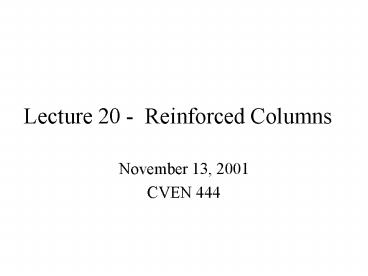Lecture 20 Reinforced Columns - PowerPoint PPT Presentation
1 / 32
Title:
Lecture 20 Reinforced Columns
Description:
Axial compression and axial compression with flexure. Members with spiral reinforcement ... Use estimate h to calculate gh, e/h for governing case(s) 1.) 2.) 3. ... – PowerPoint PPT presentation
Number of Views:640
Avg rating:3.0/5.0
Title: Lecture 20 Reinforced Columns
1
Lecture 20 - Reinforced Columns
- November 13, 2001
- CVEN 444
2
Lecture Goals
- Short column design
- Long columns
- Serviceability
3
Columns
Strength Reduction Factor, f (ACI Code 9.3.2)
Axial tension, and axial tension with flexure.
f 0.9 Axial compression and axial compression
with flexure.
(a)
(b)
Members with spiral reinforcement confirming to
10.9.3 f 0.75 Other reinforced members
f 0.70
4
Columns
Except for low values of axial compression, f may
be increased as follows
when and reinforcement is symmetric and ds
distance from extreme tension fiber to centroid
of tension reinforcement.
Then f may be increased linearly to 0.9 as fPn
decreases from 0.10fc Ag to zero.
5
Columns
Commentary
Other sections f may be increased linearly to
0.9 as fPn decreases from smaller of (fPb or 0.1
fc Ag ) to zero.
6
Design for Combined Bending and Axial Load (short
column)
Design - select cross-section and reinforcement
to resist axial load and moment.
7
Design for Combined Bending and Axial Load (short
column)
Column Types
Spiral Column - more efficient for e/h lt 0.1,
but forming and spiral expensive Tied Column -
Bars in four faces used when e/h lt 0.2 and for
biaxial bending Tied Column - Bars in 2 faces
(furthest from axis of bending.
1)
2)
3)
- Most efficient when e/h gt 0.2 - rectangular
shape increases efficiency
8
Design for Combined Bending and Axial Load (short
column)
Spices
Typically longitudinal bars spliced just above
each floor. (non-seismic) Type of lap splice
depends on state of stress (ACI 12.17) All bars
in compression Use compression lap
splice (ACI 12.16)
9
Design for Combined Bending and Axial Load (short
column)
Column Shear
Recall ( Axial Compression )
Ties must satisfy ACI Ch. 11 and ACI Sec. 7.10.5
10
Design for Combined Bending and Axial Load (short
column)
Additional Note on Reinforcement Ratio
For cross-section larger than required for
loading Min. reinforcement may be computed for
reduced effective area, Ag, ( 1/2 Ag (total)
) Provided strength from reduced Area and
resulting Ast must be adequate for loading.
(ACI 10.8.4 )
11
Non-dimensional Interaction Diagrams
or
See Figures A-6 to A-14 or ACI Common 340 Design
Handbook Vol 2 Columns (ACI 340.2R-91)
12
Design using non-dimensional interaction diagrams
Calculate factored loads (Pu , Mu ) and e for
relevant load combinations Select potentially
governing case(s) Use estimate h to calculate gh,
e/h for governing case(s)
1.)
2.)
3.)
13
Design using non-dimensional interaction diagrams
Use appropriate chart (App. A) target rg (for
each governing case) Select
4.)
Calculate required
Read
5.)
14
Design using non-dimensional interaction diagrams
If dimensions are significantly different from
estimated (step 3), recalculate ( e / h ) and
redo steps 4 5. Revise Ag if
necessary. Select steel
6.)
7.)
15
Design using non-dimensional interaction diagrams
Using actual dimensions bar sizes to check all
load combinations ( use charts or exact
interaction diagram). Design lateral
reinforcement. see Ex. 11-2 solve
for rg
8.)
9.)
16
Long Columns
Slender Columns
Slender Column
Column with a significant reduction in axial load
capacity due to moments resulting from lateral
deflections of the column (ACI Code significant
reduction 5)
17
Long Columns
Less than 10 of columns in braced or
non-sway frames and less than half of columns
in unbraced or sway frames would be
classified as slender following ACI Code
Procedure.
18
Long Column
Eccentrically loaded pin-ended column.
Lateral deflection - increases moment
M P( e D )
19
Long Column
Eccentrically loaded pin-ended column.
OA - curve for end moment OB - curve for maximum
column moment _at_ mid-height)
Axial capacity is reduced from A to B due to
increase in maximum moment due to Ds
(slenderness effects)
20
Long Columns
ACI Sec. 12.10.2 Slenderness Effects may be
neglected if k effective length factor
(function of end restraints) Non-sway frames
Sway frames
21
Long Column - Slenderness Ratio
Slenderness Ratio for columns
22
Long Column
Unsupported height of column from top of floor to
bottom of beams or slab in floor Radius of
gyration 0.3 overall depth of
rectangular columns 0.25 overall depth of
circular columns
lu
r
23
Long Column
Ratio of moments at two column ends, where M2 gt
M1 (-1 to 1 range)
M1/M2
double curvature
singular curvature
24
Long Column
From MacGregor
(non-sway frames)
Note Code 10.12.2
Possible range of 22 to 40
25
Bi-axial Bending and Axial Load
Ref. PCA Notes on ACI 318-95 MacGregor
Unaxial bending about y-axis
26
Bi-axial Bending and Axial Load
Ref. PCA Notes on ACI 318-95 MacGregor
The biaxial bending moments Mx Pey My Pex
27
Approximate Analysis Methods
Use Reciprocal Failure surface S2
(1/Pn,ex,ey) The ordinate 1/Pn on the surface S2
is approximated by ordinate 1/Pn on the plane S2
(1/Pn ex,ey) Plane S2 is defined by points A,B,
and C.
28
Approximate Analysis Methods
P0 Axial Load Strength under pure axial
compression (corresponds to point C ) Mnx Mny
0 P0x Axial Load Strength under uniaxial
eccentricity, ey (corresponds to point B ) Mnx
Pney P0y Axial Load Strength under uniaxial
eccentricity, ex (corresponds to point A ) Mny
Pnex
29
Approximate Analysis Methods
Design Pu Muy, Mux Pu, Puex, Puey
30
Approximate Analysis Methods
Pn Nominal axial load strength at
eccentricities, ex ey Limited to cases when
31
Biaxial Bending in Short Columns
Analysis Procedure Reciprocal Load Method
Breslers Formula
Steps
1) Calculate P0 2) Calculate P0y ( Pn for e ex,
ey 0 ) 3)Calculate P0x ( Pn for ex 0, e ey
) 4) Calculate Pn (from Breslers Formula )
32
Biaxial Bending in Short Columns
where, f 0.70































